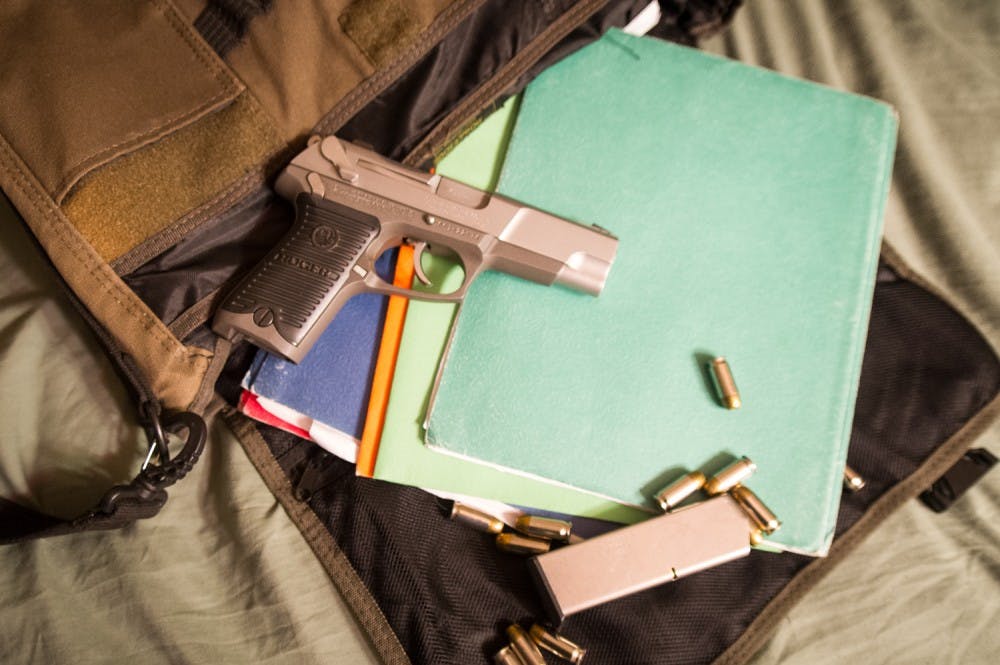In another chapter of the ongoing national conversation about the role of guns in U.S. society, an Arizona lawmaker proposed a bill that would allow students and faculty on college campuses to carry concealed weapons.
Rep. Sonny Borrelli (R-Bullhead City) proposed House Bill 2072 in the Arizona House of Representatives in early January. Borrelli was unavailable for comment at time of publication.
The Arizona Board of Regents unanimously voted to oppose the bill and another like it, House Bill 2338, which would prevent an educational institution from prohibiting someone from possessing a concealed weapon in a vehicle on a public right-of-way. The Board cited its jurisdiction over college campuses, although the bill itself extends past just universities.
According to a statement released after the decision from ABOR chair Jay Heiler, "The board opposed the bills on the basis that the board is vested with the authority to govern the state's public universities."
However, Heiler said that the board is not dismissing the issue.
"(The board) holds the primary responsibility for making policy around the university system," Heiler said. "This is a subject that the board has taken up in the past, and continues to focus on. We are still in the midst of conversation and deliberation."
He said the broader issue is campus safety and how it can be guaranteed.
Heiler mentioned a potential alternative in the form of a campus marshal program, in which certain students and staff with the proper backgrounds would receive special training to handle a concealed weapon and provide armed safety on campus. It would work something like a federal air marshal.
"Citizen-based security response will probably become a fact of life," he said.
However, if the legislature passes the bill and the governor approves it, he said the legislature has the constitutional authority to override ABOR.
The senior director for ASU media relations, Mark Johnson, said the department has a similarly hesitant response to the prospect of allowing concealed weapons on campus.
"We haven’t thoroughly analyzed this bill, but based on the advice of law enforcement and public safety experts we feel strongly that allowing weapons on campus would increase the risk of gun-related injuries to both campus police and our students," Johnson wrote in an email.
He also brought up the presence of non-students on campus, and how allowing firearms might affect them.
"It’s also important to recognize that our campuses are home to pre-schools, elementary schools and high schools, and every day they are visited by families and community groups," he wrote. "Introducing firearms into such an active learning environment would be disruptive."
Despite the broader administrative resistance to a bill that would lift the concealed weapons ban, there are those who offer significant support for the bill.
Garret Walliman is the sponsor for the ASU chapter of Students for Self-Defense, a firearm and personal defense advocacy group. He supports the bill.
"I think of it more as 'why shouldn't we (lift the concealed weapons ban)' more than 'why should we,'" he said. "I see no reason for continuing that ban."
He denied the claim that allowing concealed carry on campus would increase gun violence, pointing to several states that have legalized concealed carry on college campuses: Mississippi, Idaho, Texas, Colorado and Utah.
He said there have been no notable instances of gun violence on these campuses as a result of the lifting of a concealed weapons ban.
However, there are other states where legislatures have ruled to lift weapons bans on campus: Oregon, Kansas and Wisconsin.
There was a shooting at Umpqua Community College in Roseburg, Oregon, in 2015, four years after the prohibition on concealed weapons with a permit was lifted. That being said, the college prohibits general possession of weapons by students on campus, except as explicitly allowed by law. Students with concealed carry permits are allowed to circumvent the policy. It is not known how the shooter, a student at the college, came by his weapons, or weather he was carrying legally.
It should be noted that some of these states have only had the ban lifted for a short time, or have not yet had the new legislation lifting the ban go into effect, as with Texas.
"I think those facts indicate that by allowing concealed carry on campus we won't see an increase in gun crime," he said.
Walliman said he feels his Second Amendment rights are being violated by the concealed weapons ban, citing the controversial Supreme Court case District of Columbia v. Heller, which set a legal precedent by extending Second Amendment rights to individuals.
However, the Court's decision did not extend unlimited rights in regard to firearm possession. It extended its definition mainly to mean the possession of firearms in the home for self-defense. It also stated that previous prohibitions on the possession of weapons by felons, the mentally ill, or in sensitive areas like government buildings and schools would stand.
"If the banning of the First Amendment on college campuses would be considered unconstitutional, I see no reason that it shouldn't be the same for the Second Amendment as well," he said.
Reach the reporter at Arren.Kimbel-Sannit@asu.edu or follow @akimbelsannit on Twitter.
Like The State Press on Facebook and follow @statepress on Twitter.




